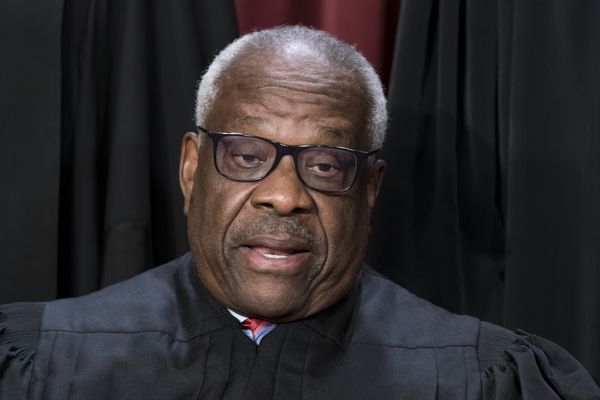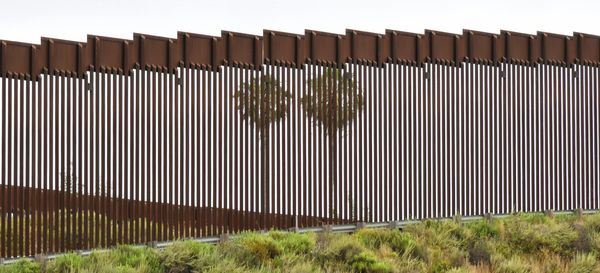Most Floridians have heard of the high-profile arrests of former felons by Gov. Ron DeSantis’ elections police force. And they might have felt little sympathy for those arrested on election-fraud charges, based on the fact that they had previously been convicted of some of the worst crimes society can imagine: Homicide and sexual offenses that sometimes involved children.
Yet a closer look reveals a lot to be concerned about, starting with the fact that DeSantis’ office has yet to offer any explanation as to why they singled out just 20 among hundreds of cases of voters flagged due to potential ineligibility — and why others, whose cases were largely identical to the 20 people charged, were not prosecuted.
Because each of the men who were charged seems to have paid their debt to society. They thought they had won some measure of redemption. When they registered to vote, they received affirmation in the form of a voter ID card with their polling place and a list of their congressional, state legislative and local districts, so they could research candidates and make decisions. Clearly, this was precious to them, which is notable in a society where many Floridians don’t even bother to register.
So they voted. And this is where those 20 stories diverge, opening a chasm that strains the concept of justice to its breaking point.
So far as the Sentinel and other media outlets have been able to discern, the difference in treatment seems to rely on where those 20 former felons lived: The ones who were arrested resided in predominantly Democratic counties, including Orange and Broward. And the arrests were granted high-profile publicity that was clearly intended to frighten other former felons away from future attempts to have their votes counted.
Others, in red-leaning counties, were spared after quiet exchanges of letters between local elections officials and state prosecutors.
“Individuals throughout the state should be treated in a similar fashion, and so this just sort of highlights the inequities in the system,” State Rep. Michael Gottlieb, a Fort Lauderdale attorney who is representing an ex-felon arrested in August, said to the Orlando Sentinel’s Christopher Cann last month. “There’s something wrong with that, especially when we’re using a state police force for political prosecutions.”
No matter how you feel about former felons voting, it’s hard to disagree with that conclusion. Yet it’s the inescapable impression that DeSantis’ Office of Election Crimes and Security has allowed to stand, even though Gottlieb and other defense attorneys who stepped forward to defend the 20 arrested voters have been calling attention to the discrepancies for months.
It’s that casual acceptance of inequity that we find difficult to stomach — and that we have been waiting, fruitlessly, for DeSantis or someone from the elections-crimes office to explain. Instead, we’ve seen a round robin of shoulder shrugging between the Florida Department of Law Enforcement, the state Division of Elections and DeSantis’ separate elections-crimes unit.
Visible inequity
Cann obtained correspondence between local elections officials and Fifth Judicial Circuit State Attorney Bill Gladson — whose coverage area includes Lake, Sumter, Marion, Citrus and Hernando counties, all markedly conservative — that reflects the kind of thinking that should have influenced arrests statewide.
In each of the cases his office reviewed, Gladson concluded that the ex-felons were not actually eligible to vote. Due to the severity of their crimes, they fell outside the parameters of a rights-restoration amendment voters approved in 2018, and had not petitioned the Cabinet to have their rights restored (which remains an option for any offender, regardless of the severity of their crimes).
But when they registered to vote in their counties, it was granted — because the state had not formally notified the local elections supervisor that they were still ineligible. “The individuals were mistakenly given voter registration cards” and led to believe they were eligible to vote, Gladson wrote. It’s a fair reading of the law: If the overburdened Department of State was unable to flag ineligible voters, local supervisors had no way to know which applications should have been declined.
Similar grace was not extended to the unfortunate 20. Instead, their quest to regain validity in society resulted in a brutal shock. After years spent behind prison bars and then fighting to restore their lives post-release, they were once again handcuffed and taken to jail with new felony charges pending. For some, it would mean the loss of everything they had struggled to rebuild: Their jobs, their homes, their chance to repay loved ones who had suffered along with them.
Orlando resident Peter Washington Jr., convicted of sex charges in the 1990s, is among them. In May, he told Cann about the impact the new charges had on his life: In 2021, a year after he voted for the first time at the Hiawassee Road public library, he was arrested. Within a week, he’d lost his job and his plans for his future — owning his own business, becoming a minister, contributing to the life he was building with his wife — were in ashes.
“My family don’t deserve this, my wife don’t deserve this,” he said. “Sometimes it brings tears … because I said (to my wife) I would never do nothing intentionally to hurt you.”
Political theater
Many of those cases are now falling apart. Some have been dismissed — including the one against Washington. But the damage, and the obvious chilling effect it has had on other ex-felons, lingers.
Meanwhile, DeSantis’ elections-security police force has gone quiet. Will Florida see another round of high-profile arrests in the months leading up to the 2024 elections — just enough to scare other voters away from the polls?
Floridians should not wait to find out. Instead, they should contact their lawmakers and demand that they pull funding and authority away from DeSantis’ private elections-crimes unit, and use it to bolster statewide efforts to identify ineligible voters, a move that will help local elections officials process applications without fear of more mistakes.
It’s not about protecting sex offenders and murderers, as DeSantis’ office probably wants Floridians to believe. It’s about honoring the will of voters who expressed support for voting-rights restoration in 2018, including the clear boundaries they set on those rights. It’s about telling the governor that it’s not OK to publicly humiliate and torture a select group of people as a form of political theater, while turning a blind eye to others.
It’s about the marked contrast between DeSantis’ repeated insistence that anyone caught voting illegally in Florida should be punished — while refusing to explain why some mistaken voters are allowed to go free.
It’s about equal justice — and that is something everyone in Florida, starting with its governor, should regard as a high priority.
____







